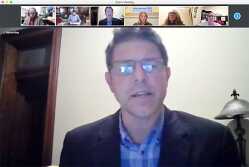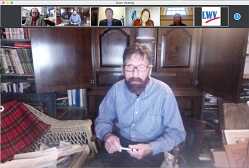District 37 candidates tackle the issues

It’s hard to have a political discussion in 2020 without the topic of COVID-19 being prominent.
The recent candidate forum featuring District 37 State Senate candidates Republican Rodric Bray Democrat Tom Wallace was no different, though the topic of education was also a hot-button topic, as it is in any state election cycle.
Presented by the Putnam County League of Women Voters, WGRE 94.3 FM and the Banner Graphic, the virtual forum featured panelists from each of the three organizations asking the two men questions via Zoom on a variety of issues.

Early in the forum Kelly Keefe of WGRE asked how the two men would manage COVID-19 expenses within schools in the coming session.
Bray, the incumbent in District 37 and current president pro tempore of the Senate, answered first.
“School funding is an important question every time we meet,” Bray said, pointing out that of Indian’s $35 billion annual budget, K-12 education funding is more than half. In the last session, the General Assembly added $763 million to K-12 funding. He also noted that all but five school districts in the state were able to give teacher raises.
“When we get back into session and pass a budget, the big question is going to be education funding,” Bray said, though he added that with tax shortfalls due to COVID-19, legislators will not be able to add as much to education funding as they did this year.
Wallace said that he thought the most important place to invest for education would be in rural broadband, as distance learning will continue to be a priority.
“With the crisis we’re going to be facing, it’s only going to be worse than what we’ve faced in the past,” Wallace said, noting that all districts must have the wherewithal to issue devices to students and find better connectivity solutions than kids sitting in the parking lots of McDonald’s or Starbucks.
“Agree with Mr. Wallace in regard to broadband. We need to improve that,” Bray replied. “We’re going to see more virtual learning go on over the years, but I do not think it can or it should replace learning in brick-and-mortar locations.”
He noted that some kids are falling behind while trying to learn from home and that reports of sexual abuse and neglect went down beginning in March, as children did not have a safe place to make such reports.
Wallace agreed with the need for a return to in-person learning.
“That’s fundamentally where we all learned our social skills,” he said. “Broadband is an auxiliary we need just because of the situation we are in.”
During the second portion of the program, an audience member asked for each man’s position on school vouchers.
“I’ve long been a proponent of school choice so that a parent can choose the right fit for their child,” Bray said. “We have a lot of great schools across the state of Indiana, but some of those are not the right fit for every family.
While not voicing his opposition to charter schools as a whole, Wallace did say he wants them to be accountable to the same state standards as public schools, since they are using public money.
“If we’re going to have charter schools, they need to have the same requirements that public schools have,” Wallace said. “Fundamentally, we’ve been ripped off by charter schools in Indiana. If they work, they work well. But we are not seeing that in Indiana.”
Bray countered that the market sort of takes care of that.
“The nice thing about a charter school that is ineffective is it can be closed,” Bray said. “But we’ve seen charter schools that are doing incredible things.”
Wallace, a retired environmental engineer, was right at home with a question regarding climate change. Rhoda Alexander of the LWV pointed out that some studies show that temperatures in the state could rise by up to six degrees by 2050. She asked what steps could be taken to mitigate those effects?
Wallace said that it’s something that will have to be adjusted to as it comes.
“It’s just something you’re almost going to have to face on a day-to-day basis,” Wallace said. “Water levels are going to change. Rain patterns are going to change. Wind patterns are going to change. You’re almost going to have to go field-by-field to make those adjustments.”
Bray also proposed an incremental attack.
“You attack this like eating a whale — one bite at a time,” he said. “You do this by attacking all different aspects.”
Bray did point out steps being taken to try and make adjustments, such as the Big Dig for Indianapolis storm water, as well as regulations for factories and power plants.
“Right now, you’re seeing a lot of change from coal plants to natural gas, also with some solar and wind,” Bray said.
On the subject of state infrastructure, Wallace again noted that “broadband should be at the top of the list,” but also had some ideas about road funding with the state facing a steep decrease in income taxes in the coming year or years.
“If you want to look at road funding, probably a two- or three-year moratorium on new projects,” Wallace said. “We should probably think that once we have spent the money on existing projects, we’re going to have to move into a maintenance mode.”
Bray countered that by passing a gas tax a couple of years ago, the state did a good job of finding a source of road funding that allows such projects to be paid for in real time. Despite other shortfalls, he seemed less worried about this funding source.
“We’ve put ourselves in a very good spot right now because of the work we’ve been doing,” Bray said. “We’re going to continue to use that tax, it’s served us very well.”
As to broadband, Bray noted that grants are allowing REMCs around the state to invest in the technology and get it to people in rural areas.
“We’re going to continue to struggle with that to get every last house because that’s no longer a luxury, that’s a necessity.”
Wallace added that there are some issues with companies having monopolies in areas and restricting such growth.
“Until we take some steps to eliminate territorial rights that some companies have, we aren’t going to get to every house,” Wallace said.
Bray agreed that such regulatory steps need to be taken.
Another hot-button issue came out when an audience member asked what can be done to improve health care in the state. Both men focused on the costs.
“That’s the only product or service that we have in the United States that you can’t find out what the cost is going to be,” Bray said.
He proposed that health care providers be obligated to publish information about the cost and quality of care.
“When you’re shopping cost and quality, you’re going to see those prices come down,” Bray said.
Wallace focused on the profits being made by drug manufacturers and others in the industry.
“We need to look at why the companies are charging these rates and is there any cause for it?” Wallace said. “Companies are making entirely too much money off of health care. It’s not a for-profit industry. It should be providing health care.”
Bray agreed that some of the executives are making hefty salaries, but would not go so far as to propose controlling prices.
“You’ll never see me try to set prices,” Bray said. “I don’t believe that’s the role of government.”
A video of the forum may be viewed at https://tinyurl.com/y675f88n.
District 37 encompasses the southern part of Putnam County and includes Greencastle south of Washington Street.
